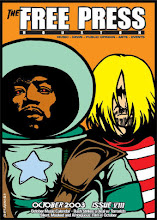SXSW Film Festival 09 wrap
The South By Southwest Film Festival and Conference just keeps getting bigger and better with every year. Films screen in several categories: major studio releases out-of-competition; narrative features; high school shorts; documentaries; special events; Canadian films that rarely get a US release; and even midnight madness.
The film festival reflects the current state of domestic affairs. Publicists are coming out of the woodwork in an effort to attract the dwindling number of print media and internet outlets that still cover cinema. New film entities are actively exploring and promoting alternative means of distribution, particularly bypassing DVDs with internet downloads.
One film, Alexander the Last premiered at SXSW even as it was offered online through IFC Festival Direct. Alexander the Last, besides being mumblecore at its best, stars Jess Weixler (Teeth) who remains unknown to auds at large but with her acting chops and screen charisma will no doubt be a major star in due time.
An example of studio fare included premieres of Observe and Report (April 10); I Love You, Man; Adventureland; Moon (mid June from Sony Pictures Classics). The latter film, directed by Duncan Jones (son of David Bowie) plays with sci-fi conventions yet takes the viewer to unexpected realms. The realistic look at mining Helium 3 on the moon is so timely that Jones also came to Houston because NASA had requested a special advance screening of the film for its scientists. SXSW also hosted a rough cut showing of Sam Raimi’s return to horror with Drag Me To Hell. Not even connected to SXSW was Universal Studios screening for free a 20-minute clip from the new Sasha Baron Cohen movie Bruno (that’s the short version of the title).
As always I managed to catch some gems that are indicative of the quality of entertainment on the festival route like Canadian director Bruce McDonald’s Pontypool. This art house zombie film keeps all the violence off screen (except for one blood spewing sequence) as three people hold out in a radio station and relay incoming reports of an infectious disease that has broken out in their small Ontario town. A couple of other Canadian docus that explore graphic and stencil artists, Roadsworth: Crossing the Line and Died Young Stayed Pretty, seemed to destined to only play to their select crowd, alternative artists.
Other eye openers were The Yes Men Fix the World (scheduled to open in the fall) and Ondi Timoner’s (Dig!) compelling internet docu We Live in Public. Timoner edits images that suggest the influence of the world wide web, even though many of the clips are from now-camp 50s era training films and the soundtrack's overdubbed. In particular We Live in Public addresses the way humanity has sublimated its need for personal contact in lieu of electronic relations. The Yes Men stage a fake press interview with the BBC where they pose as Dow Chemical (corporate owners of Union Carbide) spokesmen and announce a mea culpa for the Bhopal incident that results in a huge stock price loss for Dow. The Yes Men have a grace that similar agitprop figures like Michael Moore lack. Speaking of agitprop New World Order merely enforces the notion that Alex Jones has some great ideas but nobody will ever pay attention until he stops screaming.
Two other docs that garnered audience awards were Mine and Motherland. Mine simply breaks your heart with its depiction of pets that were lost or abandoned during Hurricane Katrina. Motherland follows the path of a group of diverse women who’ve all lost children. If Mine played well theatrically by taking the viewer on a journey that included the aftermath of a natural disaster, Motherland seemed like a Lifetime cable program by ignoring theatrical sensibilities in place of a story solely focused on emotional recovery.
The one film that stands above the others, for me anyway, was For the Love of Movies: A History of American Film Criticism. Intelligently researched and lovingly made by Boston Phoenix film critic Gerald Peary the film contains a wealth of information about pre-WWII movie critics of which most people are simply unaware. For the Love of Movies celebrates writers who formed modern day movie reviews like Otis Ferguson (who died in WWII), Robert Sherwood and Frank Woods, and takes us to up the present day where movie critics for major papers are being forced out of their jobs as they daily newspaper industry (itself a house of cards) buys out staff on a weekly basis.
There’s no way a person can see even a quarter of all the films offered at SXSW. It always remains a challenge to seek out the nuggets that will never get a true theatrical release.









0 Comments:
Post a Comment
<< Home